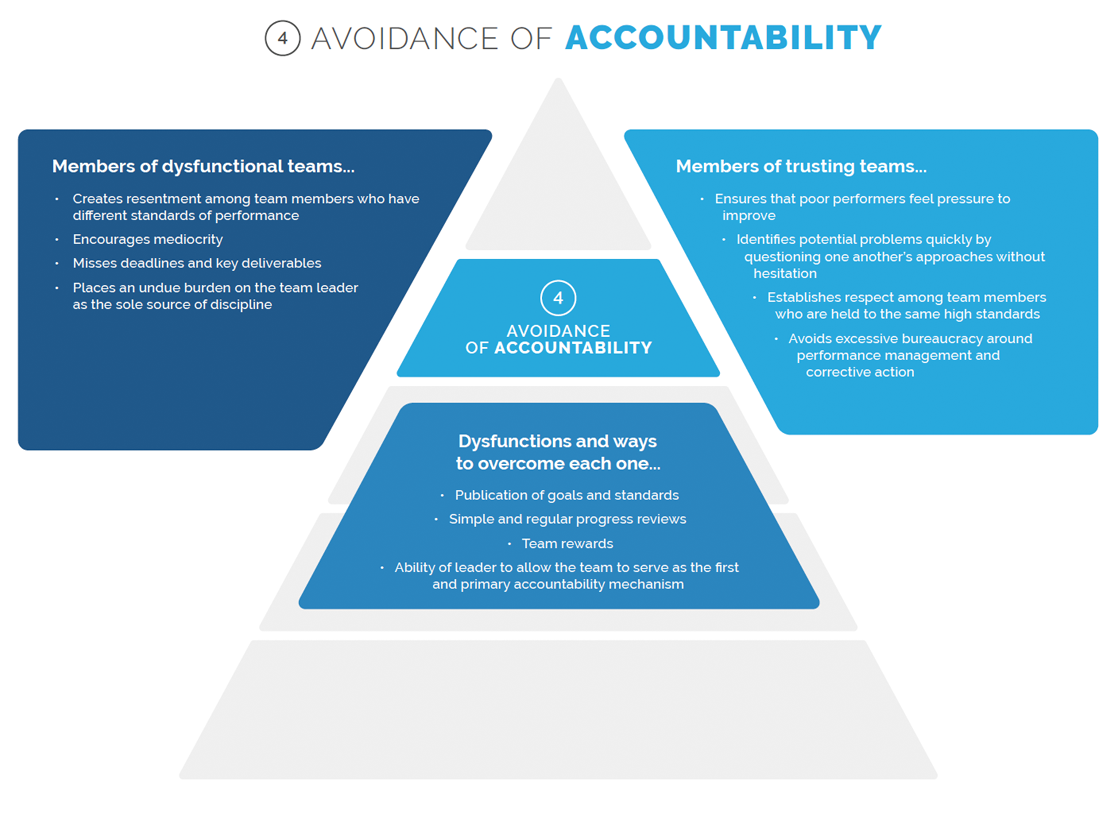The Five Dysfunctions of a Team Level 4: Avoidance of Accountability
The ability to set and meet goals is often used as a way to measure success for companies and individual employees. In an ideal world, goals are set and then achieved – on time and within budget.
Unfortunately, in the real world, dysfunctional teams often avoid being held accountable for their goals. A lack of accountability creates resentment among team members, encourages mediocrity, and places a burden on leaders who must discipline employees who miss deadlines and deliver subpar work.
For teams that are at a dysfunction level 4, Patrick Lencioni explains that dysfunctional teams are challenged by ambiguity about direction and priorities. This leads to a lack of confidence, excessive analysis and unnecessary delays. Plus, dysfunctional teams second-guess their decisions, making it hard to get anything accomplished.
Our inability as humans to meet goals has been studied often. You might be familiar with studies showing that most people fail to follow through on their New Year’s Resolutions. Although we are able to accept (and often even laugh) at our inability to achieve our personal goals, managers don’t typically have the same tolerance for missing goals at work. So, we focus on accountability. Unfortunately, that’s treating the symptom, not the cause.
Lencioni traces the root cause of avoiding accountability back to trust. McKinsey research suggests managers involve workers in the creation of goals, explaining that clarity around direction and priorities helps create trusting teams. McKinsey’s research also reports,
“Of companies who have effective performance management systems, 91% say that employees' goals are linked to business priorities.”
Lencioni discusses this in dysfunction level 3. In other words, when employees are part of the goal-setting process, they understand the goals better and have trust and confidence in the process.
Need another reason for including your team in the goal-setting process? The American Society of Training and Development (ASTD) did a study on accountability and found that an individual has a
65% chance of completing a goal if they commit to another person.
If you have a specific accountability appointment with someone you’ve committed to, you will increase your chance of success by up to 95%. Working together on goals creates that accountability.
At Executive Agenda, we can attest to the impact of a public commitment.
Our peer-group model includes a process where all members of the group follow up on and report back to the group about the progress they’ve made on objectives since their last meeting. We know (because we’ve seen it work) that our members experience greater success in part because their peers will hold them accountable to their commitments.
If accountability is a challenge for your team, take a step back and look at the lower levels of the 5 dysfunctions of a team pyramid. Dig deep and ask yourself hard questions. There is an excellent chance the problem isn’t accountability, it’s lower on the pyramid. Fixing the root cause of a lack of accountability will help your company achieve success far better than focusing on enforcement of accountability itself.
Share this article

